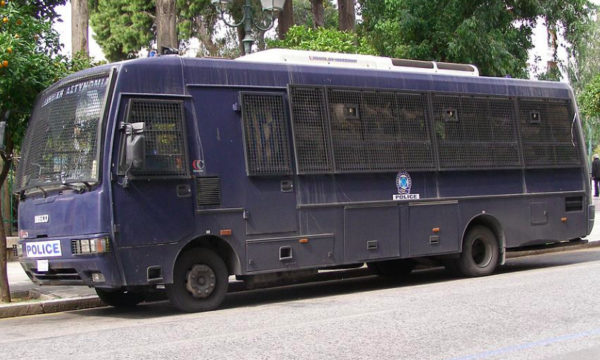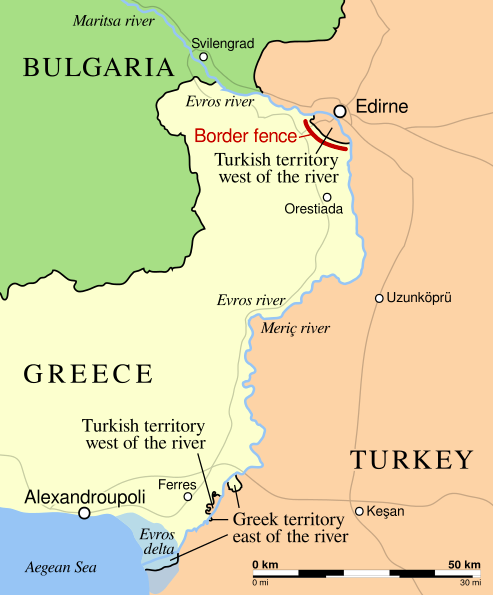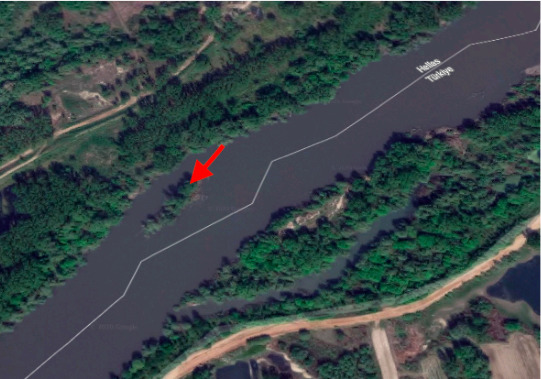I don’t know how to swim, the river came and I thought I was finished.
| 01.08.2021 | near Nea Vyssa | Anonymous Partner | 41.576086, 26.590638 | Greece | Turkey | yes | yes | yes | yes | no | no | 18 - 36 | 20 | Afghanistan, Pakistan, Syria, Morocco, Algeria, Sudan | detention, denial of access to toilets, denial of food/water | unkown | beating (with batons/hands/other), kicking, electric shock, theft of personal belongings | 1 plain clothed & 1 in a blue uniform officer in white van, 6 male police officers (two plain clothes, four uniformed) next to police van, 2 officers in police bus, 1 uniformed officer in police station, 1 officer driving blue police bus, 2 officers in green uniforms with the greek flag on their sleeves and police insignia, 4 police officers in blue uniform by river |
The respondent is a 22-year-old Moroccan man. Previously interned for six months in Xanthi Pre-removal Detention Centre, north-eastern Greece. On the 8th of January 2021 the respondent reports that he was pushed back to Turkey upon his release from custody. He alleged that this was coordinated by the Greek authorities. In the morning of the 7th of January, the respondent, together with three Moroccans, one Algerian and one Afghan (all males aged between 18 and 36) were informed by camp authorities that they were to be released. They instructed the men to collect their personal belongings and provide an address where they would be staying after their release. Afterwards, the camp authorities explained that they would drive them to the train station in Xanthi. The respondent reported the reason as being that the detention centre was “far away.” At 2:30 p.m. a white van came, reportedly carrying two male police officers. The respondent described one as plain clothed, and the other in a blue uniform. The uniformed officer was familiar to the respondent - as he was employed at the detention centre. Before the men were loaded into the van, they were told to put their bags with their clothes and phones in the back of the vehicle. These items were not returned. The van did not drive to the train station. Instead, it drove to the back of the camp. There, the respondent reports seeing six male police officers (two plain clothes, four uniformed) waiting next to another police van. The respondent recognised the four officers in uniform from the detention centre. When they exited the van, the six were handcuffed and instructed to enter the other vehicle. Inside, they found nine Syrian men. The respondent had not seen them before. The Syrian men told him that they had been waiting in a “hidden cell” just outside of the camp before entering the police van.
“They took out some people from [the cells]. They just arrived, new people, they took them out also and they drove them all back to Turkey.”When the respondent asked what was going to happen to them, one officer in civil clothing reportedly kicked him in his leg while he was being handcuffed. The respondent did not ask again. With all the men in cuffs, the group was corralled into a blue police bus.
“The bus came from the camp and they brought all of us, all 15 people.”[caption id="attachment_16823" align="alignnone" width="600"]
 Picture of a Greek police bus (Source:Wiki)[/caption]
One officer was driving the bus; another sat close to the respondent. They drove for around 45 minutes to a police station. The respondent did not remember its exact location, but recounted seeing a sign that said - “12 km away from Alexandroupoli” shortly before they arrived.
Once at the station, the group was brought inside. Here, the respondent observed approximately 40 men from Algeria, Morocco and Pakistan. Inside, the respondent reports being beaten again by an officer working at the station. He described how one beat his hands with a baton multiple times. The respondent described how the officer was playing with his baton before to frighten him and the other inmates.
Picture of a Greek police bus (Source:Wiki)[/caption]
One officer was driving the bus; another sat close to the respondent. They drove for around 45 minutes to a police station. The respondent did not remember its exact location, but recounted seeing a sign that said - “12 km away from Alexandroupoli” shortly before they arrived.
Once at the station, the group was brought inside. Here, the respondent observed approximately 40 men from Algeria, Morocco and Pakistan. Inside, the respondent reports being beaten again by an officer working at the station. He described how one beat his hands with a baton multiple times. The respondent described how the officer was playing with his baton before to frighten him and the other inmates.
“He was trying to make us scared and then he beating me first and then my friend.”According to the respondent, his friend was “violated” with an electroshock weapon by this same officer. However, when asked for further information, he seemed visibly uncomfortable to go more into detail. The respondent reports that afterwards, all men were body searched.
“Because the police wants to make sure if they are hiding any phone or any camera.”After half an hour at the station, the police transported all 55 inmates to the Greek-Turkish border in several vehicles. These were both “civil cars” and “blue police vans”, the respondent recalled. He was ordered to enter the blue police van with “metal in front of the windows.” One plain clothed officer was driving the vehicle. According to the respondent, the journey to the border lasted approximately 1 hour and 30 minutes. Upon their arrival, the people were unloaded from the van, one by one, and then reportedly assaulted with a baton by police officers.
“They were just beating us once. Some people on the head, some on the back, some on the leg.”At the border, the respondent described being taken to a site that bore no resemblance to an “official police station.” He recalled a big building surrounded by a barbed wire fence - likely one of the border-guard stations which serve as detention facilities. According to the respondent, the officers wore green uniforms with the Greek flag on their sleeves and police insignia. All officers were masked and spoke Greek. The respondent did not remember the exact number present. The respondent and the other 55 people from the police station had to wait outside in the rain for one hour. Two male police officers in green uniforms guarded the group. While outside, the respondent heard the voices of females speaking in Arabic to their children inside the building. He assumed that women and their children were detained there. The respondent reports that he did not receive any food or water, nor was he allowed to access a toilet. Then the respondent describes how, in a group of 20, he was brought to the Evros river in a white van. The Evros river forms the only land border between Greece and Turkey (see image below). In recent years, this so-called “natural” border between Turkey and Greece has been incorporated into a wider deadly defense architecture. Environmental elements such as the strong current of the river, is not deadly on its own, but made deadly by forcing people to cross the river under treacherous conditions. [caption id="attachment_16836" align="alignnone" width="493"]
 Maritsa/ Meriç/ Evros river (Source: wikimedia).[/caption]
The respondent stated the conditions in the van were very claustrophobic.
Maritsa/ Meriç/ Evros river (Source: wikimedia).[/caption]
The respondent stated the conditions in the van were very claustrophobic.
“We couldn't move inside the car because we were too many and the car was really small.”The ride lasted around 20 minutes. The van stopped on a small road that was described as surrounded by trees. When one officer opened the vehicle, the respondent reports seeing another two Greek police officers in blue uniforms who escorted the group to the river. The officers instructed everyone to be quiet and walk with a stoop. They reached the river after around five minutes. At the river, the respondent observed two male police officers in blue uniforms with the Greek insignia and balaclavas. With them were three Syrian men. One of the Syrians assisted the officers.
“There is one Syrian guy from the three guys showing them where they are hiding the money and the phones, because maybe he used to do the trip. He knows the trick like where we hide the money.”The respondent noted that the police used multiple locations to push people back. Not all people were pushed back at the same spot.
“They chose different spots in the river. Some of them to the islands, some of them from another spots.”One dinghy was used for the river crossing. The respondent asserted how around eight people at a time were put in the dinghy, which went back and forth multiple times. The respondent’s group was the last group to be pushed back to Turkey. He reports that tt was around 2:00 a.m. when the respondent entered the dinghy with seven other men (four Syrians, two Moroccans and one Algerian). Two Syrians piloted the dinghy. The respondent documented that when they were in front of a small island, the drivers ordered the group to jump into the water. The water nearly reached his chest. The eight men reached the island. From there, they had to swim to the Turkish shore. This was approximately 8 metres away, according to the respondent. In the next moments, five of the men swam across the river, leaving the respondent and the two other Moroccans on the island. Increasingly distressed and apprehensive, the respondent was the next one to cross the river (see image below). [caption id="attachment_16814" align="alignnone" width="541"]
 One of the numerous islands in the river (41.576086, 26.590638).[/caption]
One of the numerous islands in the river (41.576086, 26.590638).[/caption]
“All my friends crossed, only me, I don’t know how to swim, the river came and I thought I was finished. I thought I was done.”When he got into the water, the respondent was swept away by the overwhelming current of the river. It carried him further downstream. However, he managed to grab onto a fallen tree trunk, which he used to pull himself out of the water and reach dry land. The river is fast, with a mean annual flow rate of 103 cubic meters per second. A rate which can increase twofold between December and April. After hearing their shouts, the respondent was reunited with the others who had been pushed back. Having witnessed this scene, the two men on the island were too afraid to get into the water.
“They can’t swim. They were so worried they would experience the same thing to what happened to [me].”How the respondent described the conduct of the Greek police during this pushback is alarming. He explained:
“They were hiding. When we arrived with the dinghy to the island, we saw them first but when the pushback finished, the dinghy went back. They hide the dinghy and they hide themselves and they were watching us.”Based on this observation, it is probable that the Greek police were aware of the two men trapped on the island but refused to intervene. With their clothes soaked, the two men who remained on the island faced a life threatening situation on the cold January night. There have been reports of people dying of hypothermia after crossing the river. The threat of hypothermia for border crossers, which, after drowning, is the second highest cause of death at Evros. Now in a group of 18, the respondent decided to walk further into Turkish territory to seek help for the two Moroccan men stranded on the island. Soon after, they encountered five Turkish army officers. They explained the situation and pointed to the whereabouts of the men. The officers assured them that the pair would be rescued and gave the group directions to a village from where they could take a car to Istanbul.
“They said take a rest, we will find your friends.”The group walked for approximately one hour before reaching the village. The respondent does not remember the name of the village, but recalled that it was close to Edirne, in northwestern Turkey. One person of the group had hid 50 euros. Using this money, the five people could pay for their ride to Istanbul. The group consisted of the respondent, one Sudanese man, one Algerian man and two Moroccan men. At the time of the interview (9th of January 2021), the two men were still missing. Update: the BVMN now knows that the men were stranded on the island for three days, until the Greek police removed them. They were later pushed back to Turkey.
